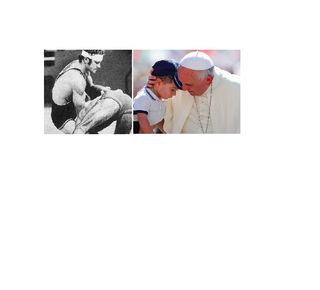Anxiety
The Wrestler and the Pope
The habits and motives of those who seek perfection
Posted December 6, 2015
Danny Mack Gable and Jorge Mario Bergoglio are worlds apart. One is a fiery former coach and Olympic wrestling champion who after running five miles would blast the car heater, windows rolled up tight, to keep the sweat pouring from him on the drive home. The other, of course, is the gentle shepherd who has captivated the world with his simple humility and compassion. Their contrasting vocations, however, mask a common purpose – to achieve perfection in what they do.
If ever there was a perfect wrestler it was Dan Gable. On his way to three state championships in high school, he amassed an unblemished 64-0 record. At Iowa State, he won two NCAA titles and lost only once in 119 matches. In 1972, he won Olympic gold, surrendering not a single point to an opponent. His lone loss, in his final collegiate match, was telling: media attention wrecked his normal routine. He would never permit that again, not to him, nor to the wrestlers he coached at the University of Iowa where he won 15 NCAA titles in 21 years. “Gold medals,” Gable once said, “aren’t really made of gold. They’re made of sweat, determination, and a hard-to-find alloy called guts.” No one had more guts than Gable. He trained six or seven hours a day, sprinting from class to class across the Ames, Iowa campus wearing ankle weights and squeezing a pressure grip while the professor lectured. All this so that guts would become habit – a routine way of life that was only more acutely manifest on the wrestling mat.
Yet in the midst of such unswerving commitment, a baffling oddity: Gable’s almost contemptuous reaction to his own success. Upon winning his gold medal, Gable blithely tossed it into his gym bag after the ceremony, throwing his parents into a near-panic thinking that it had been lost. But it wasn’t the medal or any championship that compelled his ceaseless striving. It was his family. His sister’s tragic murder had nearly torn the Gables apart. In his boyish naiveté, young Dan sought to preserve his family through his accomplishments on the wrestling match. It worked. He became the singular focus of familial energy, distracting them from the fighting, the drinking, and the blaming. It is here that we can detected the subtle outlines of the Gable-Bergoglio connection.
If ever there was a perfect saint it was Francis of Assisi, who renounced wealth and embraced “holy” poverty, trading his silk robes for nakedness, sleeping in the open and treating coins as mere pebbles on the road. Following Francis in both name and deed, the world watched admiringly as Bergoglio shunned the Papal Palace for an unpretentious guest house, rejected ornamental vestments for plain attire and rode about Vatican City in a donated 1984 Renault. This, however, was only the continuation of an already established lifestyle. As Bishop of Buenos Aires, he cooked his own meals, called a modest apartment home, and frequented public transport on his way to slums or prisons where weathered faces awaited blessing, gnarled hands awaited grasping, and tired feet awaited washing. All this so that humility would become habit – a way of life now on public display only because of his novel status as pope. As with Gable, Bergoglio’s striving is motivated not by personal reward but by higher purpose.

We are not what we think we are. Instead, we are what we practice to be. We are the daily habits we embody. If we strive for a greater perfection, either in guts or humility, we must act humbly or “gutsy.” Furthermore, the perfection we achieve will be limited by the motives that compel us, the most potent of which exist from without, not within. When we strive for something beyond ourselves, bigger than ourselves, we tap into a near-infinite source of inspiration, making the steepest heights of personal perfection scalable.


